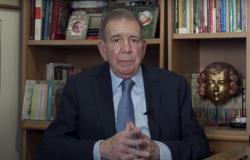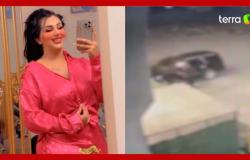
Have you ever watched The Sopranos, the world-famous TV series about a New Jersey mob boss who tries to balance family responsibilities with life in the criminal world and ends up in therapy?
If you’re a fan, you probably remember the song Woke Up This Morning that plays in the opening.
Nick Reynolds is part of Alabama 3, the band that wrote this song.
And, in a way, that’s not where his relationship with his mother ends. The Sopranos.
He grew up in the shadow of one of the most notorious crimes of the 20th century.
His earliest memories are from when he was a child — a long journey from the United Kingdom, through the United States, to the sunny coast of Mexico.
“My earliest memories are really like randomly edited scenes from a movie. And since my dad had a Super 8 camera, and I’ve seen footage from that time, it definitely blends into my memories.”
“I remember spending a lot of time in the back seat of a car, which was driven across the vastness of the USA.”
“And that in Tucson, Arizona, my father bought me a cowboy outfit.”
But the final destination of the trip was Mexico.
Memories of Mexico City and Acapulco
Mexico, he remembers, “most of all, how sunny it was, and the big avenues and the palm trees.”
His family was very rich, and his life was luxurious. “My father was in the richest 2% in Mexico.”
“I attended a school created for the children of American diplomats, and we rented an apartment from the president of the Bank of Mexico (in an elegant neighborhood of Mexico City).”
“I remember the bathtub was made of black marble, and it was huge, like a swimming pool — I could play sea battle with my toys.”
“It was a penthouse, so the view from the windows was wonderful, you could even see the Popocatépetl volcano.”
A few months later, they moved to Acapulco, a place Nick found incredible.
“The hotel had a moat around it where you could swim. There was also a pool inside, where you could swim underwater through a tunnel that connected to a lagoon in the middle of the sea.”
“Sometimes we would go out on a boat with a glass bottom, and I would see my father with his diving equipment underwater. He really liked sports: swimming, diving, cycling.”
His life was fun, privileged and idyllic.
“It was very glamorous. My father was a big businessman who sold Dunhill cigarette accessories.”
“My mother was always very elegant; she had the best clothes, and a huge collection of wigs, so every time they went out, she looked different.”
“I remember they often left me with the maid and went to Las Vegas. They were fascinated by Frank Sinatra.”
“They were very loving to me, and seemed totally in love with each other.”
For Nick, everything was normal. “At no point did I feel like I was under any threat. I felt very safe and very loved. Those, quite possibly, were the best and happiest years of my life.”
Nothing indicated that anything was wrong.
“My father was very sure of himself, and my mother believed in him 100%. If that hadn’t been the case, maybe I would have noticed that something wasn’t quite right, because children are very good at that sort of thing.”
And did he ever wonder why he was in Mexico?
“Obviously, my dad’s job was one of the reasons. I just started to wonder who my dad really was, because we had to move so often, and I had to learn different names.”
That’s right. In Mexico, his name wasn’t Nick. In fact, he estimates he had about five names between 1963 and 1968.
“They gave me a new passport, they didn’t explain anything to me, they just told me: ‘Now that’s your name, and mom and dad are called that’.”
Nick was too young to question what was happening.
“It felt like a game. I thought my dad was a spy or something… to me he looked a lot like James Bond. And it was fun that we had a secret.”
But the arrival of a visitor from England changed everything.
At first, everyone welcomed “Uncle Jack” and his family, but soon Nick’s father became worried that his presence would damage his image.
“To those who knew him in Mexico, he was practically an aristocrat, a kind of British gentleman. But Uncle Jack was like one of those nice rogues who owned a market stall.”
“I think my dad had a bad feeling, so he decided we had to leave Mexico.”
And so, out of nowhere, they went to Canada.
“It was very abrupt. My father told me, ‘Pick your favorite toys. We can only take what fits in the car. Let’s go now.'”
“It was heartbreaking, but he sold it to me as another great adventure. We were going to stay with someone who had gone to visit my father in Mexico, and had three daughters, and I really liked him, my uncle Chad.”
The family stayed in Montreal, then went to Vancouver, spent time in the south of France and finally returned to England — initially, they stayed in London, and then went to Torquay, a city that used to be called the English Riviera.
“We were by the sea, and it reminded me a little of Mexico, so I liked it.”
What he didn’t like was the school, because “it was run by nuns, and physical violence seemed to be the order of the day.” When he told his parents, they said they wouldn’t be there long.
It made sense. After all, her parents were spies. Why else would they change their names and passports? And your mother’s appearance?
“My father was practically hiding in plain sight right before my world completely fell apart.”
On November 9, 1968, at around 7:30 in the morning, the doorbell rang.
“Innocently, I opened it, and immediately a flood of police came in, they ran up to my mother and father’s room.”
“I heard a noise outside, I went to my room to look out the window, and I saw a lot of people with cameras.”
“I wasn’t scared or anything because I thought my dad was being rescued.”
“I only knew that wasn’t the case when my father came to my room and told me that he had behaved badly, that he was sorry and that he would need to leave for a while.”
“I asked him, ‘How long?’ And he said, ‘I don’t know yet.'”
“Still, I didn’t think it was serious until I saw my mom absolutely devastated, and I thought, ‘This doesn’t make sense!'”
“I couldn’t understand: If the police were the good guys, and they came for my father, did that mean he wasn’t a good guy? It confused me, because I could only imagine him as a hero.”
Nick’s father, the superhero spy from his childhood, was on Interpol’s list of the world’s most wanted men.
It was Bruce Reynolds, the mastermind behind one of the biggest and most daring robberies of his time — the famous pay train robbery.
On August 8, 1963, Bruce and a group of armed accomplices (including “Uncle Jack”), attacked a mail train running from Glasgow, Scotland, to London, England, and stole £2.5 million, the which would be equivalent to more than US$50 million (R$250 million) today.
It was a legendary and also violent robbery. The train driver, Jack Mills, was brutally beaten by one of the men, and died two years later.
So the wealth of Nick’s childhood, of those carefree days under the sun, did not come from selling tobacco.
Nick’s father was a criminal and, as he would later discover, the famous robbery wasn’t the only one he was involved in.
Before the paying train robbery, there was another very notorious one at a London airport.
“(They) were very daring. They carried out the type of robbery that, until then, had only been seen in the movies.”
Nick says that his father loved planning robberies.
“He viewed robberies as a film director, screenwriter and actor. It was a complete production unit.”
“And he told me that afterwards he felt a great anti-climax. He had just carried out the biggest robbery in the history of England at that time and, instead of feeling euphoric, he felt bad because he thought, ‘What now?'”
The answer, in the case of Bruce Reynolds, was prison. He was sentenced to 25 years, of which he would serve ten.
But what happened to Nick? How did he react after opening the door and seeing his world collapse?
“I remember that moment vividly because that was when the party ended: that six-year vacation and the family unit were gone forever.”
“My mother was completely lost without my father. Shortly after, she developed several mental health problems and, over the years, was hospitalized more than five times.”
“For her, it was the end of the world.”
“Children are quite adaptable.”
“I had a lot of faith that it wouldn’t be like this forever, and that things would get better.”
Although there was something that impressed him very much.
“When I first went to visit him in prison, my father was in a glass box – like Hannibal Lecter. I couldn’t even touch him. That was scarier. I thought, ‘My God, who is my father, to arrested him like that!'”
Nick’s life changed drastically, not least because his parents decided to send him to boarding school, a place he desperately didn’t want to be.
But there was one constant: his relationship with his father.
“I had spent more time with my father at that time than most of the other kids. We had a very, very close bond.”
From prison, “he wrote me very long letters. It was a way of teaching me about everything that interested him, so that when I went to prison we would have a lot to talk about.”
Nick also wrote to him, and went to visit him every two weeks
Of course, he kept who his father was a secret for a long time.
“If they asked me, I said I was a police officer.”
But at some point in his life, he realized that he was unintentionally doing everything his father wanted but couldn’t do.
“He wanted to be a musician, but he had no musical aptitude (Nick is still part of the Alabama 3). He wanted to be in the Navy, but his vision wasn’t good (Nick joined the Royal Navy when he finished school).”
His father loved art and used to send a postcard with every letter. On the front, the image of some work of art; and on the back, detailed descriptions of the artist and style.
Little by little, Nick also became fascinated. So much so that, today, he is the world’s leading practitioner of an almost forgotten art form: death masks.
“A death mask is made by molding the features of a dead person. It’s almost as if their last breath has been frozen in time, it’s the last portrait.”
In 2023, the National Portrait Gallery museum in London opened a new wing — and part of it is dedicated to death masks. Among them are works by Nick.
His father’s role in the pay train robbery dramatically influenced his life.
Does he sometimes wish none of this had happened? And that he could have led a normal life?
“Things can’t be reversed. You are what you are. I’ve spent my whole life trying to play the cards I’ve been dealt, and there’s no point in complaining.”
“Sometimes I find it a little irritating that at 61 I’m still ‘someone’s son’. It’s a big shadow, and a weight I’ve been trying to lift off my shoulders for many years. But it’s not easy to lift, and I’ve lived with it .”
“Anyway, you have to make the most of things in life and, if you can, see the funny side of everything.”
See below a video from 2013 about the death of one of the men convicted of robbing the paying train, Ronald Biggs.
British Ronald Biggs dies, aged 84
Tags: boy perfect childhood knowing father wanted criminals planet World
--




